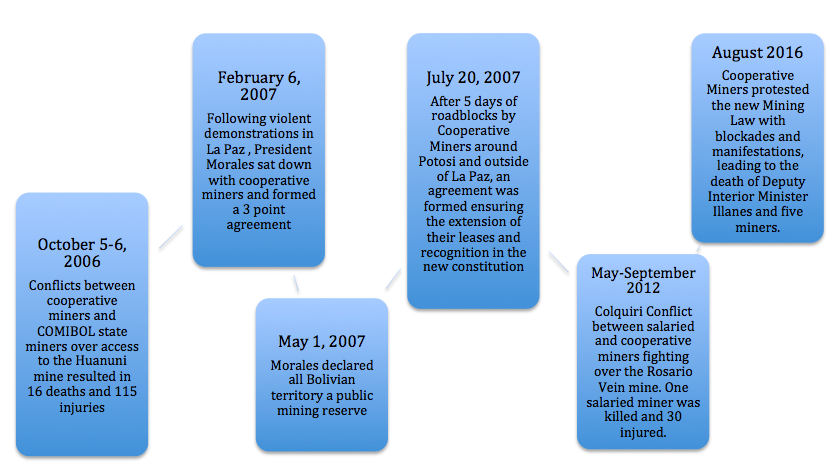Bolivian Government Regulates Cooperative Mining Sector with Executive Actions
September 2, 2016
Following the recent conflict with mining cooperatives, the Morales administration issued 5 decrees in a special cabinet meeting on September 1, 2016. Mining cooperatives escalated protests in August 2016 in retaliation against the new Mining Law and modifications to the Cooperatives Law. In particular, the mining cooperatives opposed efforts to limit direct contracts with private multilateral companies and allow unionization among cooperative members. The escalation of protests resulted in the murder of Deputy Interior Minister Rodolfo Illanes and five miners, four from bullet wounds.
The government decrees issued on September 1, 2016 declare the following:
- DS 2888: Using dynamite at protests is now punishable with a 1-4 year sentence. According to Government Minister Carlos Romero dynamite and explosive can be used as lethal weapons. In May of this year, the government inexplicably repealed a 2012 Supreme Decree prohibiting the possession or use of explosives at social mobilizations. Article 211 of the Criminal Code criminalizes the possession, production and sale of explosive materials for violence with a 2 to 6 year sentence.
- DS 2889: Cooperatives must report their members, the volume and value of production, and earnings distributions to the Administrative Mining Authority (AJAM) and the Cooperatives Tax and Control Authority (AFCOOP). If profits are not distributed equitably, as mandated by Article 6 of the Cooperatives Law, the cooperative will be obligated to readjust or be classified as a private company.
- DS 2890: Inactive mining concessions will revert to State control.
- DS 2891: Joint ventures, leases, or subleases between cooperative mines and private companies (national or international) will return to State control.
- DS 2892: Anyone employed by or providing services to cooperatives will be protected by the General Labor Law, and thus be on the payroll, have the right to unionize, receive health subsidies (including lactation subsidies), and other social benefits. In the past only cooperative members received benefits.
- Resolution 08/2016: SENARECOM (National Service for Registration and Control of Mineral and Metal Commercialization) will nullify its contracts with regional departments and local governments that allow cooperatives to maintain 1, 3, or 5% deductions for production.
The Bolivian government is demanding accountability from this ambiguously-defined sector, especially following August’s violent confrontations. Bolivia’s mining cooperatives have historically functioned in an unregulated gray area between private and state-owned systems. These decrees seek to provide some oversight to ensure lawful activity among these groups. Mining cooperatives will have to prove that they are distinct from private entities, offer more transparent information about their operations, and provide social benefits mandated by the Nation’s Labor Law.
Despite a decade of electoral support for the MAS government, the cooperative miners have clashed violently with the Morales administration’s tenure.
Timeline of Cooperative Miners Conflicts during Morales Administration


